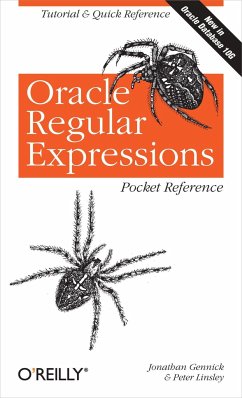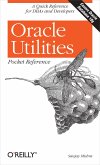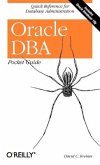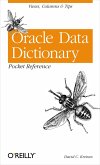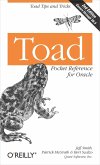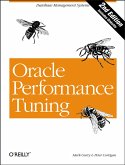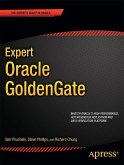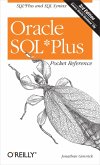Support for regular expressions in SQL and PL/SQL is one of the most exciting features of Oracle Database 10G. Oracle has long supported the ANSI-standard LIKE predicate for rudimentary pattern matching, but regular expressions take pattern matching to a new level. They provide a powerful way to select data that matches a pattern, as well as to manipulate, rearrange, and change that data.
This concise pocket guide is part tutorial and part quick-reference. It's suitable for those who have never used regular expressions before, as well as those who have experience with Perl and other languages supporting regular expressions. The book describes Oracle Database 10G's support for regular expressions, including globalization support and differences between Perl's syntax and the POSIX syntax supported by Oracle 10G. It also provides a comprehensive reference, including examples, to all supported regular expression operators, functions, and error messages.O'Reilly's Pocket References have become a favorite among developers and database administrators everywhere. By providing a wealth of important details in a concise, well-organized format, these handy books deliver just what you need to complete the task at hand. Whether you're using regular expressions for the first time or applying your skills from other languages to the latest version of Oracle, the Oracle Regular Expressions Pocket Reference is the book to have close by.
Hinweis: Dieser Artikel kann nur an eine deutsche Lieferadresse ausgeliefert werden.
This concise pocket guide is part tutorial and part quick-reference. It's suitable for those who have never used regular expressions before, as well as those who have experience with Perl and other languages supporting regular expressions. The book describes Oracle Database 10G's support for regular expressions, including globalization support and differences between Perl's syntax and the POSIX syntax supported by Oracle 10G. It also provides a comprehensive reference, including examples, to all supported regular expression operators, functions, and error messages.O'Reilly's Pocket References have become a favorite among developers and database administrators everywhere. By providing a wealth of important details in a concise, well-organized format, these handy books deliver just what you need to complete the task at hand. Whether you're using regular expressions for the first time or applying your skills from other languages to the latest version of Oracle, the Oracle Regular Expressions Pocket Reference is the book to have close by.
Hinweis: Dieser Artikel kann nur an eine deutsche Lieferadresse ausgeliefert werden.
